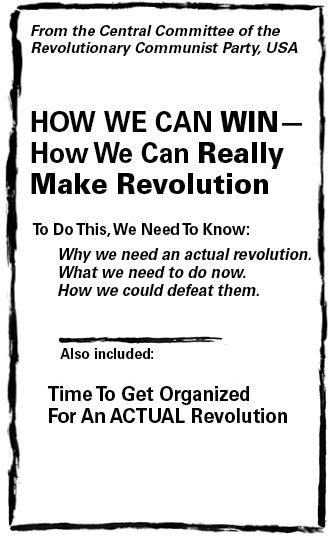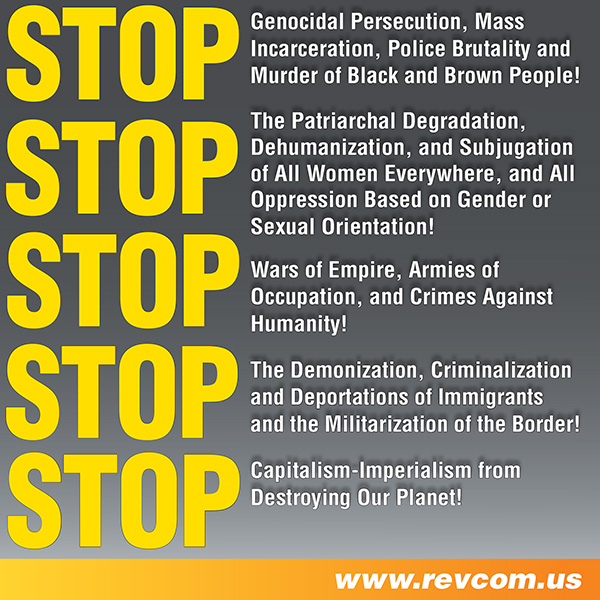Discussion At Revolution Books in Berkeley
Challenging Students at the Beginning of the School Year: “Reform or Revolution?”—What Will Your Life Be About?
| Revolution Newspaper | revcom.us
About a week after most of the new students had arrived at the University of California at Berkeley (Cal) and the day before classes started, we held a discussion on “Reform or Revolution” at Revolution Books in Berkeley. We did a similar discussion about a month ago, which attracted a lot of new people, and so we decided to do it again once school started.
Again, we built for it by setting up A-frame signs around Berkeley with a simple and bold announcement for a discussion on Reform or Revolution, along with the BAsics 3:2 quote. We did some postering and flyering at a freshman orientation event. Some students also found out about it because they had come into the bookstore in the last week.
About 35 people, including about 25 students showed up!! These were mostly new freshmen (freshpeople) and a few new transfer and international students. They came on their own, and some came in groups of three or four from the dorms. These students seemed very excited to discover a place like Revolution Books! And although they were not initially very clear on what revolution is, they were drawn to the idea, and in various ways could see the limits of reforms. Several of them also had checked out Marx, and were interested/open to communism.
After introducing people to Revolution Books and Bob Avakian, I passed out a flyer with the “5 Stops” on it, speaking briefly to the contradiction between the magnitude of these problems, and the pathetic reform “solutions” we are offered, using some examples.
We gave everyone a copy to read along while another bookstore volunteer and I read the essay from Bob Avakian’s BAsics, “Reform or Revolution: Questions of Orientation, Questions of Morality,” aloud. I asked what people thought of the analogy BA lays out about the plague and antibiotics being hoarded and guarded by armed thugs and only distributed for profit, and the two alternatives in that situation—putting wet towels on people’s foreheads to ease their suffering, or organizing people to storm the compound to seize the antibiotics and distribute them among the people.
One student used the example of an NGO dedicated to providing healthcare in poor countries, but which doesn’t even scratch the surface of the problem. Another student said that she initially thought, “it’s not as simple” as that analogy, but that she actually thinks it IS that simple—people are dying from preventable things, while the resources they need are there. A third year student talked about the campaign to get people to stop using plastic straws, and how this is a distraction that takes people’s attention away from the corporations that are the real cause of environmental destruction. Another student agreed with this example, making the point that we are told that our morality lies in our personal consumer choices, rather than getting to the root of the problem. Another student agreed, but also said that stopping the use of plastic straws can be a good first step for someone, as they become more aware.
At this point I spoke to the importance of the head and the heart. Caring about these problems is fundamental—if you don’t care, if it doesn’t make your blood boil seeing all this oppression and unnecessary suffering, you can’t be a revolutionary. But at the same time, if you don’t understand what is the cause of that oppression and what is the solution to it, you also can’t be a revolutionary. I talked about the nature of the capitalist system, based on vast socially produced wealth, which is owned and controlled privately, and that basic things like food, medicine, and housing are produced, not to meet people’s basic needs, but as commodities to be sold for profit. This is why 10 million children are dying of preventable disease every year in the Third World. It really IS that simple!
An older Black woman disagreed with me that people who are being oppressed don’t understand the causes of their oppression, saying that everyone she talks to already knows the problem is capitalism. This was nonsense, which I challenged from a number of angles, and it was good for people to hear the back and forth on this. One student made the point that Marx was wrong about the idea that workers would automatically rise up and make revolution. Other people chimed in on this, adding that people should already be rising up given what’s happening. This was an important opportunity to speak to some of what is new in Bob Avakian’s New Communism, including the very important break with the unscientific notion that proletarians obtain revolutionary “class consciousness” simply by virtue of their oppressed/exploited condition, and that revolution was inevitable… and at the same time, the crucial strategy for revolution that has been developed. I held up the “5 Stops” flyer again, asking people to think about how many people care about one or more of these “Stops,” and that the basis for revolution lies in the fact that none of these huge problems can be solved without a revolution, and people can come to see that. I also pointed out how many people showed up here, hungry to dig into these important questions!
At this point we passed out HOW WE CAN WIN—How We Can Really Make Revolution to people, briefly describing what it is, and encouraging people to take stacks of them to get to others. Grappling with this question of a revolution to actually defeat and dismantle the “armed thugs” who enforce the system, one young woman talked about the problem of a huge “power differential” in terms of weaponry, etc. She said, you would have to vastly outnumber them, but that maybe it would be more “practical” to convince the capitalists to share their wealth… although she didn’t think they would do that. Another student, returning to the antibiotics analogy, said that ultimately there’s no other way besides forcibly taking the antibiotics and distributing them among the people.
Lastly, the question of elections came up. Almost everyone thought that the “two party system” was bullshit, although one student insisted on the importance of local elections for things like school boards, using almost the identical argument that Bob Avakian had addressed in the essay, “How can I just sit back and wait for revolution, while people are suffering now.” Another bookstore volunteer talked about the strategic importance right now of “fighting the power and transforming the people, for revolution.”
At the end, I reiterated the importance of this discussion becoming a mass debate in society, and as part of that people can take these HOW WE CAN WIN pamphlets and get them to others (a number of people did). I encouraged everyone who appreciated this type of discussion and engagement to become a volunteer with the store. I acknowledged that there was a lot that was new for people, and that not everyone was convinced of the need for communist revolution, and that people should continue to come to the bookstore and get into Bob Avakian’s works… but for those who are convinced we need this type of revolution, or are leaning in that direction, I’m part of the Revolution Club that is seriously organizing now, preparing people for an actual revolution—and that youth and students are a key part of every revolution—and you should come talk to me about it! About five students came up to me afterwards, and others talked to other bookstore volunteers. We made a plan for this Friday to discuss HOW WE CAN WIN. One young woman who wanted to join the Revolution Club said that she really likes communism, but has a hard time with the accusations that get made about the history of communism, so she picked up the interview with Raymond Lotta in Revolution newspaper about this.
To Revolution Clubs and Revolution Books around the country: I really encourage you to do discussions like this, aimed at students, right at the beginning of the school year! The sooner the better, while they are very open to new things and checking out groups to get involved with, before they get bogged down in classes and homework. Keep it simple… put flyers/posters advertising a discussion of “Reform or Revolution” all over campus—I think people will come—and then read the BAsics essay and discuss! There’s so much in that beautiful essay to get into, which we barely touched on, including important questions about morality and epistemology, and how all that relates to “social approbation,” which is something that really weighs on young people. And it will be a great on-ramp to HOW WE CAN WIN, the strategy for an actual revolution.
 Get BAsics – Order from RCP Publications or download the eBook
Get BAsics – Order from RCP Publications or download the eBook
Get a free email subscription to revcom.us:

Volunteers Needed... for revcom.us and Revolution
If you like this article, subscribe, donate to and sustain Revolution newspaper.


